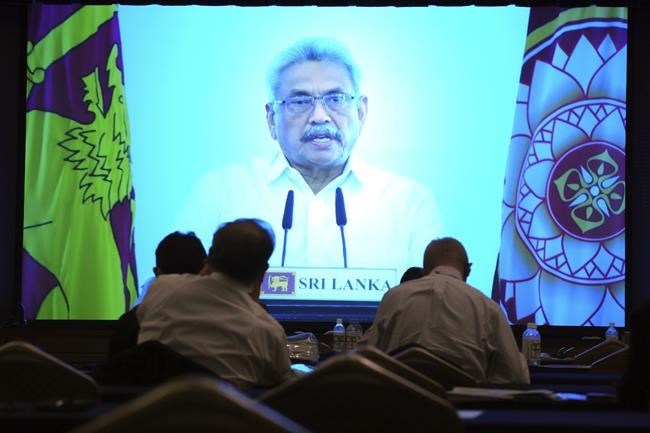OTTAWA — Canada is imposing sanctions on four senior leaders of Sri Lanka, including two recent presidents, accusing them of human rights violations during that country's civil war.
The news came as a surprise to Sri Lanka's high commission in Ottawa, which told The Canadian Press it would rather have the Canadian government raise its concerns directly.
The sanctions target former president Gotabaya Rajapaksa, who resigned last July, and his older brother Mahinda Rajapaksa, who has held the titles of president and prime minister.
Gotabaya temporarily fled his country last summer after mass protests over living costs, while Mahinda resigned from his post as prime minister last spring.
Sri Lanka's majority Sinhalese population had praised the brothers for defeating Tamil separatists after a 26-year civil war, but they are now banned from any financial dealings in Canada.
Also sanctioned are two senior military officers, including Sunil Ratnayake, whom a court sentenced to death for his role in a massacre of Tamils in 2000.
Ottawa is also sanctioning navy commander Chandana Prasad Hettiarachchi, who has been accused of abducting civilians who were later killed.
The four are barred from entering Canada under the Special Economic Measures Act.
The announcement gained substantial media attention in South Asia. While Ratnayake and Hettiarachchi had faced sanctions from the U.S., it is exceedingly rare for a recent head of state to be barred from entering a Western country.
Sri Lanka's Deputy High Commissioner in Canada, Anzul Jhan, said her government is committed to peace and would rather Ottawa raise its concerns directly.
Jhan noted that Sri Lanka has committed to a United Nations plan for accountability, reconciliation and devolving power. The country has signed memorandums with various other countries to formalize bilateral consultations, but she noted Canada has yet to sign on to such an agreement.
Sri Lanka's current president, Ranil Wickremesinghe, took office last July, and "has started formal discussions with all Tamil parliamentarians on a way forward, to the ethnic issue in Sri Lanka," Jhan said.
The high commission noted that roughly 300,000 people in Canada have Tamil roots in Sri Lanka
"Therefore we believe Canada has a role as peacemaker and all issues should be discussed bilaterally," Jhan said.
"In this background, the Canadian announcement comes as a surprise."
Last month, Wickremesinghe said his country has "undergone the bleakest of times, immense hardships" due to last year's "abject economic collapse."
This report by The Canadian Press was first published Jan. 10, 2023.
Dylan Robertson, The Canadian Press

